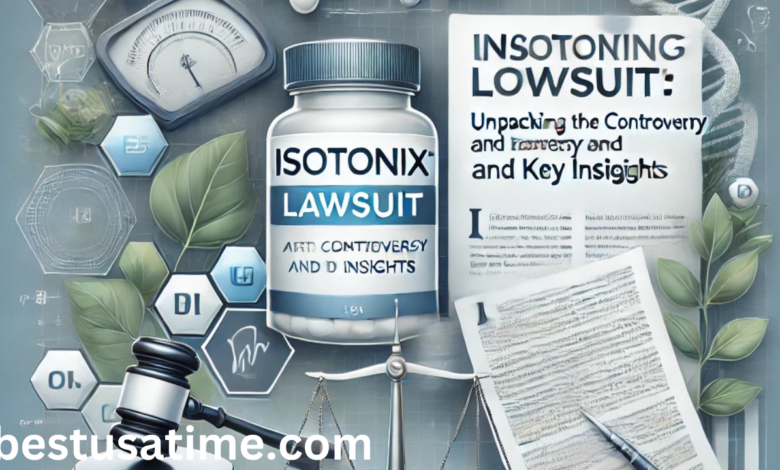Isotonix Lawsuit: Unpacking the Controversy and Key Insights

1. Introduction to Isotonix
What is Isotonix?
Isotonix is a line of health supplements marketed by Market America, a global e-commerce company. These products are renowned for their isotonic delivery system, isotonix lawsuit a formulation method that claims to enhance nutrient absorption by mimicking the body’s natural fluid composition. Isotonix offers a variety of supplements, including multivitamins, antioxidants, and specialty formulas targeting specific health concerns such as joint health and digestive wellness.
The isotonic delivery system is the cornerstone of Isotonix’s marketing. By delivering nutrients in a liquid form that matches the osmotic pressure of the body’s fluids, the products promise faster absorption compared to traditional pill-based supplements. This innovation has garnered significant attention and a loyal customer base.
Reputation in the Health and Wellness Industry
In the competitive health and wellness industry, Isotonix has carved out a niche as a premium brand. With endorsements from independent distributors and testimonials from users, the products have achieved substantial visibility. However, the brand’s reputation has also been scrutinized due to its multi-level marketing (MLM) business model, which some critics argue prioritizes recruitment over product quality.
As the brand gained traction, it also attracted regulatory and legal challenges, particularly concerning its marketing practices and product claims. These controversies have raised questions about the efficacy and ethicality of Isotonix products, culminating in the recent lawsuit that has shaken the brand’s standing.
2. Background of the Isotonix Lawsuit
Overview of Legal Claims
The Isotonix lawsuit revolves around allegations of false advertising, misleading health claims, and potential regulatory violations. Plaintiffs assert that the company’s marketing materials overstate the efficacy of its products, presenting them as scientifically validated solutions to complex health issues without sufficient evidence to back these claims.
In addition to misrepresentation, the lawsuit examines whether the company’s MLM structure fosters deceptive practices. Critics argue that distributors are incentivized to prioritize recruitment over product sales, raising concerns about ethical conduct within the organization.
Timeline of Events
The legal dispute began with complaints filed by consumers and watchdog groups, which subsequently gained traction through investigative journalism and regulatory inquiries. Key milestones include the initial filing of the lawsuit, preliminary hearings, and the company’s public response. These developments have kept the controversy in the spotlight, prompting increased scrutiny from both the media and the public.
Legal Basis for the Claims
The lawsuit hinges on consumer protection laws and regulatory guidelines governing health product advertising. Central to the case are allegations that Isotonix products fail to meet the high standards implied in their marketing. Legal experts also point to potential violations of Federal Trade Commission (FTC) regulations, which prohibit false or unsubstantiated claims about product benefits.
Impact on Consumers and Stakeholders
For consumers, the lawsuit has amplified concerns about the reliability of health supplement claims. Many loyal users feel betrayed, while potential customers are approaching the brand with increased caution. For distributors, the legal challenges have introduced uncertainty, potentially affecting their income and long-term business prospects.
3. Analysis of Key Issues
Product Efficacy and Safety Concerns
One of the central issues in the lawsuit is the efficacy of Isotonix products. While the isotonic delivery system is marketed as a revolutionary advancement, critics argue that there is insufficient scientific evidence to substantiate these claims. For instance, while faster absorption is a theoretical advantage, it does not necessarily translate to improved health outcomes.
Safety is another concern. Although Isotonix products generally use ingredients deemed safe, some users have reported mild side effects, such as gastrointestinal discomfort. These instances, while isolated, raise questions about the thoroughness of the company’s testing and quality control processes.
Marketing and Misrepresentation Allegations
The lawsuit also highlights the aggressive marketing tactics employed by the company’s distributors. Advertisements often use anecdotal testimonials rather than empirical data, creating a perception of exaggerated benefits.
Additionally, the MLM structure of Market America incentivizes distributors to make bold claims to boost sales. Critics argue that this pressure can lead to unethical behavior, such as misleading potential customers or failing to disclose the limitations of the products.
Legal and Ethical Implications
Beyond the specifics of the lawsuit, the case raises broader ethical questions about the health supplement industry. The lack of stringent regulations allows companies to operate in a gray area, making it challenging for consumers to distinguish between legitimate products and overhyped offerings. For the industry, this lawsuit serves as a cautionary tale, emphasizing the need for greater transparency and accountability.
4. Current Status and Outcomes
Latest Updates on the Lawsuit
As of now, the Isotonix lawsuit is still unfolding. Preliminary hearings have shed light on the evidence presented by both sides, with the plaintiffs emphasizing discrepancies between the company’s claims and scientific reality. Meanwhile, Market America has issued statements defending its practices, asserting that its products meet all regulatory requirements and deliver genuine health benefits.
Impact on the Brand and Industry
The lawsuit has already had a tangible impact on Isotonix’s reputation. Social media platforms are rife with debates among consumers, and industry analysts are closely monitoring the case for its implications on MLM companies as a whole. Some experts predict that the case could lead to tighter regulations for health supplement marketing, potentially reshaping the industry landscape.
5. Conclusion
Summary of Key Points
The Isotonix lawsuit serves as a pivotal moment for both the brand and the health supplement industry. From allegations of false advertising to broader concerns about ethical marketing practices, the case underscores the importance of accountability and transparency.
Looking Ahead
As the lawsuit progresses, it will likely set a precedent for how health supplement companies navigate legal and ethical challenges. For consumers, the case highlights the need to approach health claims with skepticism and rely on evidence-based recommendations. Ultimately, this controversy may catalyze positive change, encouraging greater integrity within the industry.
6. Frequently Asked Questions (FAQs)
What is the Isotonix lawsuit about?
The lawsuit alleges false advertising, misleading health claims, and regulatory violations related to Isotonix products.
Who filed the lawsuit against Isotonix?
The case was initiated by a group of consumers and advocacy organizations concerned about the brand’s marketing practices.
Are Isotonix products safe to use?
While generally considered safe, some users have reported mild side effects. The lawsuit raises questions about efficacy rather than outright safety.
What are the specific claims made in the lawsuit?
Key claims include overstated product benefits, lack of scientific backing, and unethical marketing practices.
Has Isotonix made any official statements regarding the case?
Yes, Market America has defended its products, asserting compliance with regulations and emphasizing their health benefits.
How does this lawsuit affect the health supplement industry?
The case may lead to tighter regulations and heightened scrutiny of marketing practices in the industry.
What should consumers look for when choosing supplements?
Consumers should prioritize evidence-based products, consult healthcare professionals, and review independent research before purchasing.
Where can I find reliable information about ongoing lawsuits?
Trusted sources include regulatory agency websites, reputable news outlets, and official court records.
You May Also Read: https://bestusatime.com/v4holt/
